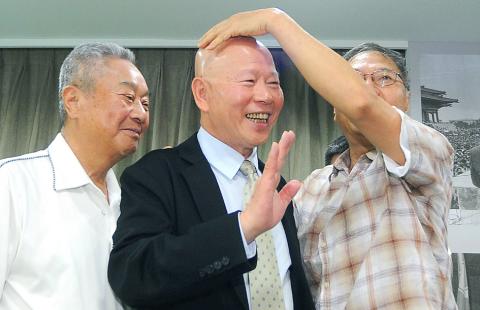The registration period for the Democratic Progressive Party (DPP) chairperson election closed yesterday as former DPP chair Hsu Hsin-liang (許信良) and former DPP legislator Chai Trong-rong (蔡同榮) completed their registrations and made the election a five-man race.
The 76-year-old Chai became the oldest candidates in the field, with former vice premier Wu Rong-i (吳榮義) not far behind at 72 and Hsu at 70. Former premier Su Tseng-chang (蘇貞昌), seen by many as the favorite in the May 27 election, and former Tainan County commissioner Su Huan-chih (蘇煥智) are 64 and 55 respectively.
The thing that got Hsu the most attention when he delivered a campaign statement at a post-registration press conference was that his top “policy” was to support former DPP presidential candidate Tsai Ing-wen (蔡英文) to run again for president in 2016.

Photo: Liu Hsin-De, Taipei Times
Hsu, who took the party helm twice in the 1990s and withdrew from the party in 1999 to run as an independent in the 2000 presidential election, proposed to make Tsai’s candidacy official DPP policy and said the DPP should choose a presidential candidate in 2014, along with the nominations for the seven-in-one elections that year.
The policy platforms should focus on the ultimate goal — helping the DPP to return to power, he said.
“I have always believed that true loyalty to your political party is the way to help your party win power. Any viewpoint or policy that hinders that goal should be changed because those policies would eventually become empty words if your party fails to win power,” he said.
Hsu dedicated a large part of his campaign statement to praising Tsai, describing her as a “God-sent gift” to the DPP and saying that Tsai had run a remarkable campaign, despite losing.
“Tsai is a highly valuable asset for the DPP, but I’m afraid that she might be sidelined by the party’s internal power games,” Hsu said.
Hsu said that he had made no prior deals with Tsai before making the endorsement and his policy platform reflected his own views.
Hsu said he believes he is the right man to clear all obstacles, re-direct the DPP’s focus to social welfare and the underprivileged, include all social and democratic movement advocates in the party and ultimately pave the way for the DPP’s return to power.
In 1995, Hsu proposed that Taiwan should move boldly westward toward China, but yesterday he did not touch on China policy. He said his position “has been very clear for a long time” and that details would be revealed and discussed in an election debate to be organized by the DPP later.
Hsu said he proposed the establishment of a “cross-strait affairs committee” if elected and mentioned former premier Frank Hsieh (謝長廷) as the best candidate to head the committee.
In a press release, Su Huan-chih praised Hsu’s commitment to concentrate on party affairs and not run in future elections, but expressed concerns about Hsu’s early endorsement of a specific presidential candidate.
“It could stir up internal strife at an early stage, obscure the focus of the election and hurt the party’s image,” Su Huan-chih said.
Chai, who is backed by independence supporters and groups, told a press conference that he is still confident of winning, despite Su Tseng-chang being tipped as the favorite.

Alain Robert, known as the "French Spider-Man," praised Alex Honnold as exceptionally well-prepared after the US climber completed a free solo ascent of Taipei 101 yesterday. Robert said Honnold's ascent of the 508m-tall skyscraper in just more than one-and-a-half hours without using safety ropes or equipment was a remarkable achievement. "This is my life," he said in an interview conducted in French, adding that he liked the feeling of being "on the edge of danger." The 63-year-old Frenchman climbed Taipei 101 using ropes in December 2004, taking about four hours to reach the top. On a one-to-10 scale of difficulty, Robert said Taipei 101

Nipah virus infection is to be officially listed as a category 5 notifiable infectious disease in Taiwan in March, while clinical treatment guidelines are being formulated, the Centers for Disease Control (CDC) said yesterday. With Nipah infections being reported in other countries and considering its relatively high fatality rate, the centers on Jan. 16 announced that it would be listed as a notifiable infectious disease to bolster the nation’s systematic early warning system and increase public awareness, the CDC said. Bangladesh reported four fatal cases last year in separate districts, with three linked to raw date palm sap consumption, CDC Epidemic Intelligence

Taiwanese and US defense groups are collaborating to introduce deployable, semi-autonomous manufacturing systems for drones and components in a boost to the nation’s supply chain resilience. Taiwan’s G-Tech Optroelectronics Corp subsidiary GTOC and the US’ Aerkomm Inc on Friday announced an agreement with fellow US-based Firestorm Lab to adopt the latter’s xCell, a technology featuring 3D printers fitted in 6.1m container units. The systems enable aerial platforms and parts to be produced in high volumes from dispersed nodes capable of rapid redeployment, to minimize the risk of enemy strikes and to meet field requirements, they said. Firestorm chief technology officer Ian Muceus said

MORE FALL: An investigation into one of Xi’s key cronies, part of a broader ‘anti-corruption’ drive, indicates that he might have a deep distrust in the military, an expert said China’s latest military purge underscores systemic risks in its shift from collective leadership to sole rule under Chinese President Xi Jinping (習近平), and could disrupt its chain of command and military capabilities, a national security official said yesterday. If decisionmaking within the Chinese Communist Party has become “irrational” under one-man rule, the Taiwan Strait and the regional situation must be approached with extreme caution, given unforeseen risks, they added. The anonymous official made the remarks as China’s Central Military Commission Vice Chairman Zhang Youxia (張又俠) and Joint Staff Department Chief of Staff Liu Zhenli (劉振立) were reportedly being investigated for suspected “serious